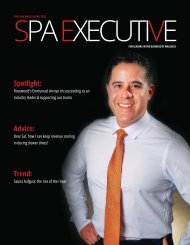Spa Executive May 2024
You also want an ePaper? Increase the reach of your titles
YUMPU automatically turns print PDFs into web optimized ePapers that Google loves.
The importance of travel<br />
for wellbeing<br />
We know from separate studies, particularly<br />
the Harvard Study of Adult Development,<br />
that relationships are the main key to<br />
happiness overall. And travel can help with<br />
that. According to a 2020 Amex Trendex<br />
study from American Express, 91% of<br />
respondents say that the ability to travel is<br />
important to their overall happiness, while<br />
86% say travel is important to maintaining<br />
healthy relationships with family and friends.<br />
But that’s obviously not all it’s good for.<br />
A 2022 study by Japanese researchers<br />
designed to investigate the effects of a winter<br />
vacation on individuals’ wellbeing found that<br />
people who traveled had higher subjective<br />
levels of wellbeing than those who did not.<br />
The authors wrote that the findings<br />
underline the importance of taking vacations<br />
and savoring recovery experiences while off<br />
work. They also highlighted the importance<br />
of “mastery experiences,” which are activities<br />
performed that distract from one’s job<br />
by providing challenging experiences<br />
and learning opportunities in other areas<br />
and offer opportunities to experience<br />
competence and proficiency. “People place<br />
a high value on learning new skills and<br />
knowledge and hard-won experiences while<br />
on vacation, and such experiences may help<br />
improve wellbeing,” they wrote, also noting<br />
that simply experiencing something out of<br />
the ordinary enhances wellbeing.<br />
Another study backs up the idea that<br />
the more we travel the happier we are. A<br />
2021 study from the School of Hospitality<br />
Business Management at Washington State<br />
University found that frequent travelers are<br />
happier with their lives than people who<br />
don’t travel at all. Researchers found that<br />
survey participants who reported regularly<br />
10 | <strong>Spa</strong> <strong>Executive</strong><br />
traveling at least 75 miles away from home<br />
reported being about 7% happier when<br />
asked about their overall wellbeing than<br />
those who reported traveling very rarely or<br />
not at all.<br />
“While things like work, family life and friends<br />
play a bigger role in overall reports of<br />
wellbeing, the accumulation of travel<br />
experiences does appear to have a small yet<br />
noticeable effect on self-reported life<br />
satisfaction,” study author Chu-Chu Chen<br />
said. “It really illustrates the importance of<br />
being able to get out of your routine and<br />
experience new things.”<br />
Finding of previous research by Chen found<br />
that taking a leisure trip provides<br />
opportunities for relaxation, detachment<br />
from work, mastery experience, and<br />
personal control. The research examined<br />
the role of tourism experiences as a stress<br />
reliever and as recovery and found that<br />
these trips had positive effects on life<br />
satisfaction. Short trips were found to help<br />
people recover from work stress, while<br />
longer trips provide more opportunities for<br />
recovery experiences.<br />
The role of novel experiences<br />
in happiness<br />
Some of the benefits are derived from a<br />
human desire to seek out new experiences.<br />
A 2021 study from New York University<br />
found that new and diverse experiences are<br />
linked to enhanced happiness, and that this<br />
relationship is associated with greater<br />
correlation of brain activity. The results,<br />
authors said, revealed a previously unknown<br />
connection between our daily physical<br />
environments and our sense of wellbeing.<br />
“Our results suggest that people feel<br />
happier when they have more variety in<br />
their daily routines – when they go to novel<br />
places<br />
and have a wider array of experiences,” said<br />
researcher Catherine Hartley.<br />
The study tracked people by GPS and<br />
found that those who had more variability<br />
in their physical location reported feeling<br />
more positive: “happy,” “excited,” “strong,”<br />
“relaxed,” and/or “attentive.” Subjects also<br />
underwent MRI scans and results showed<br />
that people for whom this effect was the<br />
strongest exhibited greater correlation<br />
between activity in brain regions associated<br />
with the processing of novelty and reward.<br />
Collectively, these studies underscore the<br />
significant positive impact of travel and<br />
vacation planning on overall happiness and<br />
wellbeing. Whether it’s the anticipation, the<br />
variety of new experiences, or the act of<br />
traveling itself, each aspect contributes to<br />
enhancing life satisfaction and mental health.

















